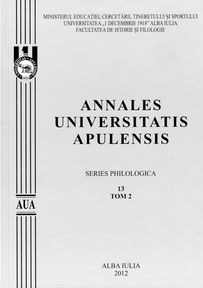William Faulkner’s Critical Reception in Romania
William Faulkner’s Critical Reception in Romania
Author(s): Marinela LupsaSubject(s): Literary Texts
Published by: Universitatea »1 Decembrie 1918« Alba Iulia
Keywords: Faulkner; Romanian criticism; reception; ideologies; literary theory; critics
Summary/Abstract: William Faulkner was one of the Western novelists who enjoyed a wide critical readership. The studies and articles devoted to his prose works, the great number of translations from his literary work, all bear witness to his distinctive place in Romanian letters. The wide range of Faulknerian studies in Romania reflects on the different critical and theoretical trends, methods at work in the Romanian literary scholarship. In the context of the redefinition of literature, it should come as no surprise that the diversification of genres was attending by a re-directing of much of the critical attention that had been previously been given to the ‘great classics’ of world literature. In the field of exegeses devoted to the American writer, although new editions of the translations into Romanian have been issued, accompanied by new prefaces or introductory essays, much of the criticism published after 1989 has been, like the translations, modified, reprinted, old material. This reprinting of translations and criticism on Faulkner’s books suggests that the writer’s position in the Romanian canon of world literature is as valid as ever. Postmodern and contemporary literature is at present the preferred object of academic criticism rather than already established,”canonic” writing. This fact confirms Bogdan Lefter’s opinion that, for all the apparent “post-totalitarian cultural effervescence”, the writers, literary critics and journalists of the early nineties have brought no major changes to the Romanian literary discourse. With his experimental style, Faulkner has been much more difficult to digest by uninformed readers; he has also been more difficult to be made digestible by critics. Despite, his ambiguities invite a wider range of interpretations, even if they preserve him fresh for every new consumption. This new complexity made it possible for translators and critics to introduce the Southern novelist to the Romanian reading public in a variety of aspects: as the linguistic experimentalist (Aurel Dragoş Munteanu, Radu Lupan), the cryptosocialist (Sorin Alexandrescu, Ana Cartianu), the liberal humanist as moralist (Nicolae Balotă). The defining fact of Romanian culture, mentioned by Nicolae Balotă, Marcel Corniş-Pope, Adrian Marino, Bogdan Lefter, and others, is that the most seminal changes that brought about the “reversed innovatorism” of the ANNALES UNIVERSITATIS APULENSIS. SERIES PHILOLOGICA 20 nineteen sixties and seventies and the postmodernism of the nineteen eighties came from the inside of the Romanian artistic and critical thinking. Nicolae Manolescu, Marcel Corniş-Pope have entered the polemic around the globalization/tribalisation dialectics, a model which involves the creative recognition of the privileges inherent in the marginalized condition of minor cultures. It also involves the recuperation of that branch of theory which, before 1989, aimed at incorporating an analysis of the social and ideo
Journal: Annales Universitatis Apulensis. Series Philologica
- Issue Year: 13/2012
- Issue No: 2
- Page Range: 19-28
- Page Count: 10
- Language: English

